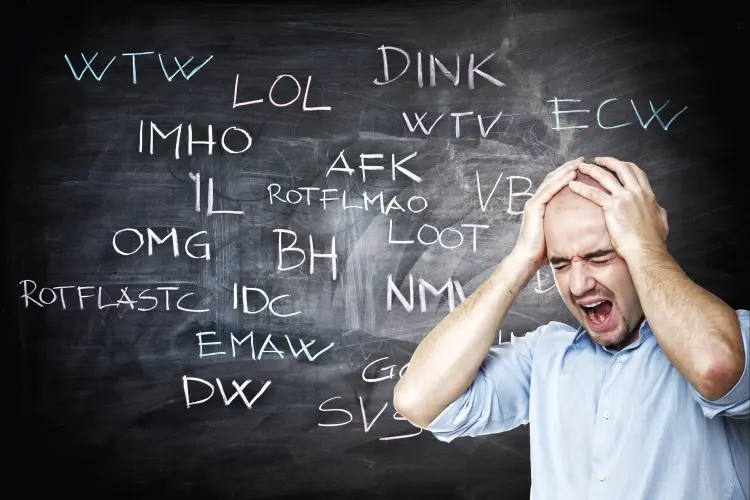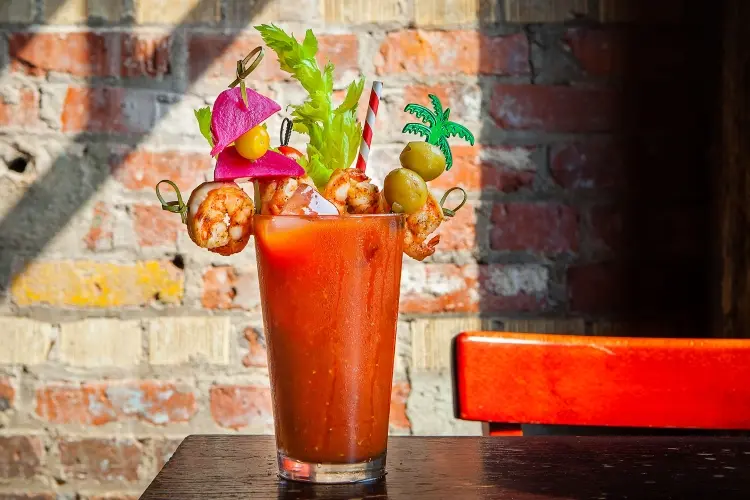by Tony Joshie
Slang is certainly the easiest and most convenient way to learn about another culture in today's time. Whereas the literature of a language lets you know about the region's history, slang allows you to communicate to today's generation in a language they prefer. Slang began gaining popularity in the mid-18th century when people realized that it was different than the words used in documentation. Slangs were most commonly used in saloons and bars back then to communicate with each other less formally. And some of you might be surprised to know that slang originated from Great Britain.
Contents
The 21st-century generations are more adapted to the American slang due to its popularity through TV and social media. Though, the iconic American Actor Dennis Ferina himself said, "The British have slang words as we do, but it was fun."
Being the pioneer of slang language, they have an expansive slang language that has modified and developed over the years from one city to another.
So, if you are an Anglophile looking forward to learning the common slangs used in Britain widely by Generation Y & Z, you're at the right place. Here's a list of all the slang words and phrases with their meanings you might want to use in routine to blend with the crowd.
What better combination you would find in slang than blending bloody and absolutely together to produce absobloodylootely. It sounds as cute as much it emphasizes the likeness towards something when you use the word.

Just think about telling about how delicious their cupcakes are, and you go , "I absobloodylootely love these cupcakes!" However, don't forget that it is also used in a vulgar way sometimes.
Where usually the slang words are used as a less critical form of curse, ace celebrates and congratulates. Besides used as slang in terms of wonderful, it is also used to show excellence or passing with distinction.
The most common examples might include "I aced my exam" and "He's ace at his game."
Need to make friends but don't know how? Don't worry. These two words have your back. All Right? is an everyday slang and it does not definitely require an answer! Treated as a greeting, these words can be seen used among friends and family as a friendly expression.
Certainly not the most recent and popular slang in British English nowadays, all to pot is still widely used. It is usually used to express failure or something going entirely wrong. A fine example can be your efforts going to pot when your friend didn't show up at the party.
Somehow the word speaks for itself. Yes, you got it right. It is just another modification of "ass" used in the US slang. Though it is one of the variations, this word can have a whole lot of them, just like the British slang where arse constructs many more common slangs.
Who said having arse as a slang word in your language restricts you from using ass? This word is universal, and probably people understand it equally well globally. Though it might be taken as a curse in some regions, the British just take it as a slight warning.
Binding, as the name suggests, might cause you to lose your eye-sight, but how is it used as slang, right? It is used to describe something splendid or so great that you probably didn't see coming! An excellent shot by a cricketer can be described as blinding too.
The British slang is populated with words that allow communicating with friends (other than the near-to-cussing slang). A bloke is referred to as a guy or friends in general, what you would call a dude in the US slang. Or you can use the word to describe a man in general.
As in, "Harry is such a noble bloke."
Though the word bloody is used extensively other than the British slang, it originated from Britain. In the past, it was perceived as a swear word. Now, owing to the common use of the word, it is considered slang and not considered very inappropriate anymore. Usually used to emphasize a particular thing, it is also used as an expression of anger.

For example: "It's a bloody mess!"
You must have heard the word. But we are afraid to tell that if you hear a British person saying bog casually, he might definitely not be talking about a damn mud. It is a slang word used for the lavatory or restroom in the British slang language. Thank us later!
This is a simple one, right? Just like a bog is a toilet or lavatory, a bog roll refers to a toilet roll. Might get some time to adapt to the word, but use it carefully to confuse with any other term.
Another prevalent slang that is not used in a very positive way. You can take it as a variation of bloody as both are used to express dismay and considered curse words in the past. However, it can both be used as an expression of slight disappointment or extreme disbelief.
Bonus: You must know that the word describes testicles and scrotum too.
Somewhat similar yet different to the previous slang word, bollocking means to get a piece of mind from an employer or a co-worker, or your significant other!
For example, "My boss gave me a hard bollocking for surpassing the deadline."
The frequent usage of the word in British slang is not new. It originated in 1948 and has not seen a fall in popularity . Bonkers is an internationally well-known British slang meaning crazy or mad. Some people find it offensive, yet the youth takes it easy.
Another word having the same meaning is Barmy, and they are used interchangeably.
Yes, it is not just restricted to British slang anymore but used globally to depict something great or wonderful. However, now the word has been trimmed to a more trendy and fashionable "Brill", serving the same purpose.
"I heard your article got featured in an international magazine. That's brilliant!"
We wonder the British slang is flooded with slang words and phrases that depict expressions of happiness and sorrow. Bugger is such another word with a vast implementation from dissatisfaction and dismissal to being stuck in a challenging situation or expressing surprise.

For example, "Bugger it! I will miss my flight now."
A common yet somehow vulgar way of saying, "Nothing at all." People use it to express that they did nothing at all the whole day, have nothing, or good for nothing.
For example, "The new gardener is bugger all use."
Not Absolutely slang, but helpful while you're in the UK. A car park is a word commonly used for what you call in America, a parking lot or parking garage. It refers to the area outside a building or anywhere else to park your cars.
For example, "Hey, I'll get my car from the car park."
Cheers is not only used in Britain, instead of a part of many other languages. However, the meaning or context of use varies. Unlike other places, cheers express gratitude or to say "thanks" other than toasting celebrations.
Used to show annoyance or displeasure against something, cheesed off is a common slang word in the British language.
For example, "I felt really cheesed off having to stand at the end of the queue."
Chuffed might not be extensively used as it did in the past; it still holds significance in the British slang. Being British, it is just natural to be chuffed up and not show it to others! Chuffed refers to happiness or delightedness, especially at one's achievements.
Chunder might not be the word you want to use often, yet it is popularly related to drinking and drunk nights. Meaning "to be sick" or "to vomit," chunder has a common usage.
For example, "Probably drinking so much wasn't a good idea as I chundered shortly after."
CV is just a British term what the Americans refer to as a Résumé. CV is short for Curriculum Vitae having and used internationally.
Daft is another slang word to tease your friends or to converse with close friends. However, it can be used generally, too. Daft means silly, yet it is not offensive. Quite commonly used in the British slang.
For example, "I thought of Scott's idea to be daft, but it saved us from the trouble."
I feel like Taylor Lautner is a bit of a dish! And I guess you feel the same, as dishy is used to describe a (sexually) attractive male. You may take it to be dapper and handsome, but someone people fall for instantly.
If you don't fancy Taylor Lautner much, you might call Ryan Reynolds dishy!
It is usually used to describe a party or an event. It does not mean to indicate any particular event. It just identifies a party in general. You would find this word to be quite commonly used.
For example, "See you at Laura's graduation do tonight."
The word dodgy is used to talk of something suspicious or illegal, just as you'd say, "Shady." Quite a popular slag term, dodgy has been used for a while.
For example, "I had a dodgy burger in lunch, and my stomach hurts now." Or "James seems to be a dodgy guy." Both are correct uses of the term.
A not-so-ear-pleasing yet trendy slang term in Britain is dog's bullocks. Usually, people use it to talk about something perfect by calling it dog's bullocks.
For example, "The musician at the party was the dog's bullocks."
Dosh is just a simple slang term for money or cash or bucks. Used quite commonly casually, dosh is used for all kinds of currency.
For example, "I thought we could go to the local, but I got no dosh."
Just how it sounds, easy-peasy is used to talk about something that is not difficult.
For example, saying, "Maths seem to be easy-peasy for Patrick." Or "I didn't know that baking a cake is so easy-peasy."
It is quite a favorite term of the British as they love faffing. Faffing or faff is about spending unnecessary time over something that could have been said or done swiftly.
For example, "I understood I was leaning back on the deadline, so I need to stop faffing."
Fluke is a rare or lucky occurrence that does not happen often. It usually refers to something that occurs coincidently or luckily, and you might not be able to witness it again.
Just a simple word used in routine in Britain. Fortnite means two weeks. Not commonly used in the USA, but very common in the UK.
For example, "I will be away from work for a fortnight."
Calling somebody full of beans is a way of telling how energetic they are. Sometimes, it is also used to express annoyance regarding someone's energy that is troubling others. Usually, people who are full of beans are always on the go, according to British slang.
For example, "Anna was full of beans even after cleaning the whole place."
Give us a bell usually signifies "Call me" in simple words . The "us" doesn't mean several people; instead refers to "me."
For example, "Give us a bell when you get home."
Gobsmacked can be more conveniently defined as another expression for jaw-dropping. It comes from "gob" (a British word for mouth) and how your mouth opens in disbelief on coming across something utterly surprising.
For example, "I was gobsmacked when I got a chance to meet Chris Hemsworth."
The word is used to express deep sorrow about something. It one of the most emotionally intense words to show dismay or sadness, and you would find it being extensively used to express grief.
For example, "Georgia is utterly gutted after her breakup."
Haggle is an informal word in the British language for a bargain. It usually means having a discussion or argument about an item's price and if it is worth that much or not.
Jammy or jammy dodger is a popular British slang referring to somebody who is very lucky. Commonly, if you encounter fortunate events frequently, people around you might call you jammy.
For example, "You've always had the brighter side, jammy!"
Knackered is used to show exhaustion and tiredness. Mostly, the words tired or exhausted are replaced by this slang version among friends.
For example, "I am all knackered after a busy day at work."
The phrase speaks for itself, explaining that it at least includes losing something. Sometimes people use it to talk about someone who has lost their mind or acting ridiculously.
Mate is used to referring to your friends more affectionately generally. And if you don't have friends, calling people this way might land you some friends! It is also widely used as a greeting term in Britain. As in, "Hey mate!" or "What's up, mate?"
If you are easily persuadable or gullible into believing something, you are a mug in Britain! It is usually used to refer to a person who can believe anything and everything someone tells them.
For example, "You 're such a mug that you believed all of his lies."
In common British slang, mush is just another word used to represent your mouth.
For example, "Shut your mush" or "Stop stuffing your mush."
If you are learning British slang, naff is an essential word to add to your lexis. It is used to describe something uncool and quite a common slang term.
For example, "It sounds a bit naff, but broccoli is a delicious side."
Not my cup of tea is simply used to talk about something that is not in your favor, or not possible to be done by you. It might be used to describe situations that are not quite pleasurable.
For example, "Spicy Korean food is not my cup of tea."
The sound quite speaks for itself. It is just another adaptation of the word "not." Nowt just simply means "nothing." You can say, "There's nowt I have to do with the matter."
Off-colour describes anyone looking different than the usual, kind of ill. It can also refer to someone who is under the influence of weather and looks a bit sick.
For example, "You look a bit off-colour today."
You might be calling your pants as pants in the US, yet you might not want to show your pants to anyone in Britain. In British slang, or language generally, pants are undergarments worn under the trousers.
Piece of cake and Cup or tea can be thought of as interchangeable slang terms. It is not, in reality, connected to cakes or confectionery, instead used to describe something that is easy peasy.
For example, "Riding a horse is not a piece of cake for everyone."
Pissed is another word that is a part of both US and British languages. It is better to know that pissed does not mean annoyed in British slang to save yourself from misunderstanding . Pissed means blindly drunk in the British slang.
For example, "I shouldn't have drunk so much. I'm pissed."
Porkies or pork pies are used to represent lies. Though porkies is more commonly used, pork pies is also quite much used owing to its rhyme with pork pies.
The British use the word posh to talk about the elite class of society. It can also be used to express the fanciness of a particular thing or place.
For example, "Have you heard about the new posh restaurant in town?"
Rubbish is the British version of Trash. It is about everything that goes into the bin and is also used as a general term to refer to something unpleasant in conversation.
Scrummy can be called a short-form of scrumptious and refers to delicious food. It is a fairly popular term and extensively used to describe mouth-watering food.
As bad as it sounds, the word does not actually exhibit something unpleasant . It is a typical teenage slang word that depicts something cool.
For example, "I would love to go to the party at John's place, it sounds sick!"
Saying that you're spending a penny usually means to talk about going to the bathroom. The slang birthed when the public toilets in Britain charged a penny.
Swear is not unknown to the US natives, but it is a pleasant surprise that this word means the same in both languages. Swear, in British slang, means to abuse or curse.
For example, "I had to make sure we do not use any swear words in front of our children."
Taking the piss is about mocking or taking advantage of someone. But it is usually used as an informal derogatory or mocking term. It is among the most popular and most commonly used words in British slang.
For example, "He took a piss at our friend yesterday at the bar."
To take the biscuit means to be exceptionally bad . A similar phrase in the US English for "take the biscuit" is to take the cake.
For example, "I have had badly cooked steaks, but this one takes the biscuit."
Waffle in the British slang refers to unnecessary talking without anything in particular. It is used to represent long banter without a reason or closure.
For example, "Please stop waffling when you do not have anything particular to talk about."
Wobbler is a word used as an alternative to throwing a tantrum in the US language. It is also used to express unsteadiness or improper balance.
Yakking is another term for talking too much. Usually, it represents continuous, noisy blabbering without a particular reason.
For example, "You could have enjoyed the show, but you were busy yakking."
Yonks is a simple word that indicates time. Yonks is informally used to talk about time and has become a part of the British slang language to represent a long period.
For example, "We went to Hawaii yonks ago."

About Tony Joshie
Tony's journey as a blogger began several years ago when he discovered his love for the visual arts. Fascinated by the stories behind the masterpieces and the artistic techniques employed by renowned artists, he started sharing his thoughts and interpretations on his blog.
 |
 |
 |
 |
Popular Posts
Try FREE Gifts right here, right now. Or receive Freebies Goodies nothing but cool items.
Once successful, button below
 |
 |
 |
 |